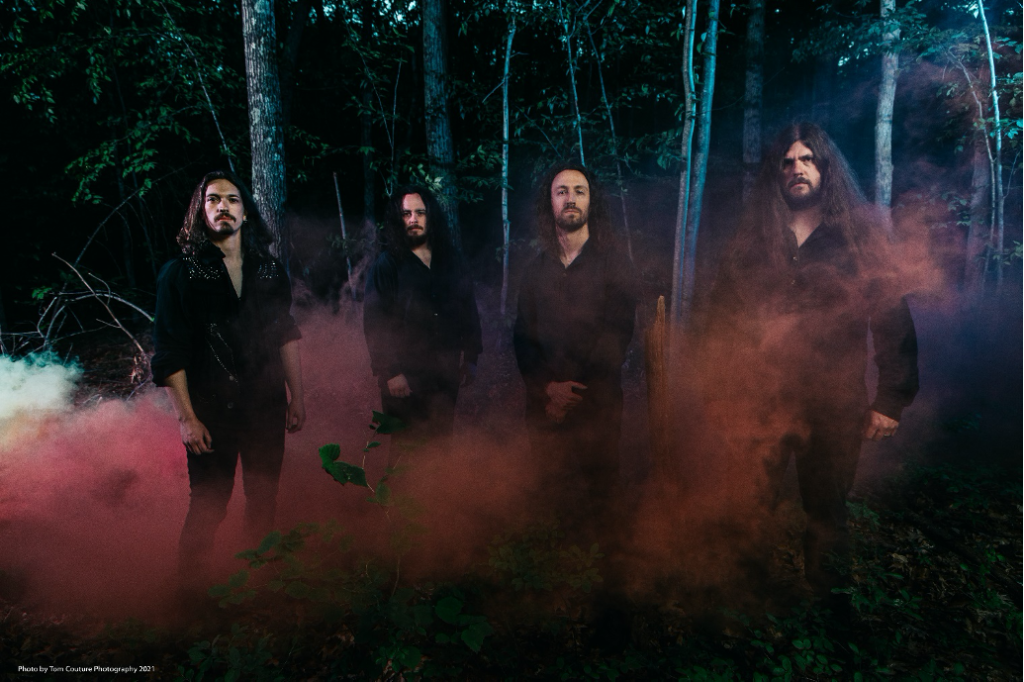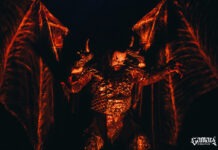American progressive metal act WILDERUN recently released their new album, “Epigone,” through Century Media Records. We decided to catch up with the band to explore the new record in more depth. Watch our interview with bass player Dan Müller below or read the full transcript below…
Hi Dan! Thanks for taking the time to sit down with me to talk about “Epigone.” The last time I talked to someone from the WILDERUN camp was 1.5 years ago. How have you and the band been?
I’m very good. I’m happy to have seen the positive reviews and comments from online and from various sites. And just hoping that we can bring that good vibe to a live audience soon enough.
Speaking of a live audience, even though bands have had very few shows over the past 2.5 years, you guys managed to squeeze in a little tour at the end of 2021 with SWALLOW THE SUN. How was it to be on tour with them?
Very good. They are great guys and I’m very fortunate to call them friends of mine now. The response from fans has been great. And just shaking off the dust and the rust from the 2 years of not doing anything live. It was very much needed and hopefully will invigorate us for future plans that we have.
SWALLOW THE SUN is a Finnish band. I presume there was some alcohol involved?
[laughs] I think it comes and goes. I think everyone is simultaneously excited to be on the road. There is an element of like, let loose and party a little bit, but also, you don’t want things to go wrong so you’ve got to keep a certain amount of levelheadedness to you. [laughter]
I get it. I learned as a Belgian that Finnish people know how to drink. [laughter] Anyway, let’s talk about “Epigone”; one thing that was different to me on this album from your previous work was the electronic elements. While watching some interviews, I learned that it was you who did those. What can you tell me about the process behind that?
When we started working on the orchestrations and the sense for the record, I’d started by working primarily on pad-like elements because that’s just what came naturally. I had just gotten a sequential circuits Prophet rev II, which I used for most of the sounds on the record. And at first, I was very enamored by kind of the warmth of the polyphonic analog synthesizers, but I very quickly got frustrated at how repetitive it started getting, so once I finally got fed up enough, I just started doing stuff that was just really off the wall and [it] ended up being that when I sent that stuff to the guys, that that was the stuff that really invigorated everyone more so than that. It just opened new doors for the sound that we didn’t realize actually fit. And then as the process went on, we leaned into that a little bit more and went back to previous songs we work worked on earlier in the process and started incorporating that more. So it was like really opening the floodgates for what was possible within a WILDERUN record, as far as synthesizers and sound design goes.
I guess that that was a little bit more of an experimental approach for you; are you happy with the results you got?
Yeah. I would say right now, [that] it’s my favorite record that we’ve done. Historically, I’ve have always thought whatever the latest output was was my favorite, so maybe I’m a little biased, but I really enjoy the more experimental sides and doing things that are a little bit off-kilter and just trying to pave new paths for us. So that to me is most exciting.
Do you feel like your band allows that as well? I feel like your sound has changed so much over the years that it’s like, at this point, anything can be WILDERUN really?
Honestly, there is an element of that. Almost anything I’d say. There are certain things that, when we try things out, we’re like, “well definitely not that,” and I can’t articulate why those certain things just don’t work in a WILDERUN context. But it’s a feeling that we all have when something works and when it doesn’t, and we’re all pretty in sync with that feeling. So it’s just a matter of seeing what we can do, how far we can push things, before they start tipping over the edge of just sounding to copy-paste or anything you know.
Do you feel like when you are composing music together, that you’re on the same page as well with these things, or are there lots of like disagreements within the band that we’re not aware of?
Disagreements I think are natural and they’re healthy. It’s also in order to know that something you’re doing is good, you have to be able to defend that idea. So I really do enjoy working collaboratively because I have that feedback, so I’ll do something that I think is cool. I’ll show it to the rest of the guys. And they’ll start to pick it apart and then I have to kind of defend my position if I really do think is good. And sometimes in the process of trying to defend my position, I realize it’s not really that good. Or at least it’s not the right thing for that moment in a song. I really very much value everyone’s opinions on that and because everyone in the band has such different familiarities with the various styles of music, it allows us to communicate in a very open way that… our vocabulary is greater than a band that listens exclusively to metal.

The themes of this record are kind of based on the imposter syndrome and are basically about an artist’s journey while creating art. So logically, the album can go to really dark places, but also to more hopeful sounds. Is that sort of what the process of creating music is like for you personally?
Yeah, I think it’s something that we all have been feeling. At this stage in our career, I think it’s a question that inevitably comes up for everyone but then, especially when you feel like things might be starting to finally hit the ground running, you start to kind of you start to wonder if you’re losing ideas, and it’s like at some point, have you ever reached the pinnacle of what you can really say and does what you say after that have any meaning? I’ve imagined the longer our career goes on, the more we will struggle with that. Everyone is a complex person to some degree but how much can you really articulate and especially if you approach things pretty broadly in your lyrics and in your music previously, then you’re kind of left off with repeating that I say my idea and trying to be more specific with it, but then it naturally feels less organic because you’re still drawing from a lot of the same ideas.
I know that most of you attended Berklee College of Music. What I was wondering… I don’t know what art education is like in America but in Western Europe – I studied art – it’s kind of very traditional. The process there is that you would show your art and then they tell you that you suck and you’re not an artist, then you feel bad. I’ve always wondered if that could be a thing that spurs this imposter syndrome. Is that something that you guys also went through as students?
Yeah, I think the basis of any kind of artistic program in a university setting probably more or less is like that and even with Berklee, there’s an element of that. I will give props to Berklee, especially in the majors that I studied – that being film scoring and electronic production design – that they did do a lot of focus on technical knowledge, being able to produce a project from start to finish and without that education, I would not be as well versed in that as I am now despite all the YouTube videos and articles that exist to teach you otherwise. But I think being in a music university setting… the most valuable thing to that is being surrounded by like-minded people and making those connections very organically. I mean, there are people who will go to a university and self-serving thing. In the case of us, when we own that at Berklee, we all just kind of naturally found our way towards each other because we had similar interests in metal, which was a fairly small community at Berklee, to begin with. So naturally, we found like-minded individuals like that and really birthed from that interaction and allows us to have like a good personal dynamic that sustains everything, even when professional and musical and artistic differences start to butt heads a bit.
You mentioned earlier about how you sometimes would have to defend your ideas if the others don’t like it. Do you feel like you learned that defending your ideas is something you learned at school?
Absolutely. Certainly being able to take criticism and a lot of people, when they first enter a college or university setting, you come from a natural place of wanting to be nice. Everyone just wants to have a good time. And that is true, you do want to sustain that positive energy. But if you’re just complimenting everything that someone does, then they never get to learn anything. I mean, if not more so than the professor who’s teaching material, because of that feedback, because you get to dip your toes into a world where a small group will tell you what they think. So I definitely, throughout my experience, leaned more into that was like really trying to figure out how to pick something apart, give the compliments where compliments are due, but also do my best to find something that could maybe warrant criticism, no matter how small, just because you might open a mental door for someone that they might not have been able to find by themselves.
That’s actually really interesting. I’m an art photographer and they always say you can learn photography from the internet. But there are certain things that I feel like I learned at school, like dealing with criticism. I see that happening with musicians too. I guess it might be a bit easier for you to deal with criticism from people online. I see on your YouTube videos that you often react to both negative and positive comments, which is cool to see.
Yeah, a lot of friends of mine who are electronic music producers, I see this a lot where it’s very insular, because you’re creating everything by yourself, you’re mixing everything by yourself, and sometimes you’re mastering it yourself. So, from the very genesis of the first musical idea, you have to put it in front of a wider audience, the only person you’ve had to critique your material is you and frankly, I don’t think that’s a good idea. You need to have people around you to bounce that back and forth. And if you don’t have that community, if you truly are on your own, I mean either find other like-minded people or just put stuff out there and just let the bad criticism be useful to you.
Do you find your fans’ opinions important? You guys have a Discord group to interact with your fans. Not a lot of artists do that.
I think it’s definitely important. It can get… that’s a slippery slope, though. So in previous album cycles, I would typically read a lot of comments. I would have a YouTube video and I poke through and I was able to kind of laugh off any kind of negative comments and stuff for the most part. But with this record, it’s just been hard to keep up with everything. It’s definitely gotten more of all that and when you have a larger pool of people listening to your stuff, you’re gonna have a larger pool of people who don’t like it and give half-second thought-of feedback in the form of a YouTube comment that for some reason sticks in your mind as being more important than all the comments of praise, and that’s not healthy. Now the Discord, I do actually like. I’m usually not one who’s very keen on social media, but the Discord is something that I actually have enjoyed more. I think it’s a more legitimate form of healthy social media, at least as it is right now. And hopefully that continues, because it’s a smaller pool of people. It’s not just anyone looking for anything, it’s people who are there to, you know, be fans of WILDERUN. So I value those opinions a little bit more because I know it’s people who know what we’re trying to do on some level. But at the same time, having an abundance of praise in comments and whatever is also… can tilt the other way where it becomes so you’re just completely shrouded in good comments all the time that you’re you never get to experience a truly inward look that is meaningful. So I try to take everything with a grain of salt.
“Epigone” can also mean a less distinguished follower or imitator. A lot of people compare you to OPETH. Is that something that bothers you since I am guessing you want to be known as WILDERUN and not that band that sounds like old OPETH?
There’s an element of that, for sure, but when I think about it more, I think… I keep saying there’s got to be a reason because I really don’t believe us to be just an OPETH clone. I do think we have a lot more going on that is our own voice. But at the same time, it makes me think like, “well why do people think that?” Over the past few months now, I’ve been thinking about that more and more. I think the reason for that is that… I mean OPETH is undeniably a progressive-rock-used-to-be-progressive-metal band, and they created a certain… they essentially created a genre within progressive metal that still doesn’t have a name, but it can be defined as some sort of melancholic progressive metal with death metal tendencies. And because we do something that fits in that, people say like, oh, it sounds like OPETH instead of saying it sounds like melancholic progressive metal. It’s like any band that sounds that does that kind of material sounds like OPETH. That’s just the shorthand to say that but I don’t. I don’t think everybody necessarily means that we’re ripping off OPETH or that any band who sounds like that is ripping off OPETH. At least that’s what I hope.
[laughs] Well, I certainly don’t think so. I do notice that a lot of people like to compare you to them. At the same time, I think that people might just really miss the old OPETH and really like that there’s another bands doing something that reminds them of that.
I think that’s undeniable that there aren’t a lot of bands doing that kind of sound. You know, for a band as influential as OPETH, I’m surprised that there actually haven’t been more bands that really take that sound further. So, I think us being one of the fewer bands that you could throw in that category, kind of puts us in the line of fire of that kind of assessment.
Going back to the album, I also felt that it sounds a little bit more spaced out and somehow more focused on the listening experience itself. There was, for instance, a moment after “Identifier” where there was a more quiet moment. Was that a conscious decision, maybe not to overwhelm the listener, because I know that your material can be like a bit overwhelming at first?
That’s exactly the intention of that. When we were doing the mixes for the record that… we didn’t have that track at first, so it would just go straight from the end “Identifier” into the ending guitar part for “Distraction.” And every time we would listen to the mix, by the time that that opening guitar part came out, we’re like, “I can’t listen to this right now… I need a break.” I don’t want to hear more notes right now, I’ve been barraged by notes aggressively for the past however many minutes it’s been, I just need to breathe. So let’s mess around with some soundscape thing you know, so first, we tried doing stuff, using like some kind of nature sounds or something that was more tranquil or just organic in some sense, but we’re like, that is very reminiscent of what we did on “Sleep at the Edge of the Earth,” and it’s also just been done by countless other bands. We’re not going to do that again. Evan had ended up finding a poem by David White, I believe is the poet’s name, called Ambition. And something about that poem really spoke to him as being related to a lot of the themes on the record. So what we did is we, I took a recording of him just reciting that poem and I ran it through my modular synth and processed it, and generated that track from it. So it was a way of kind of subconsciously taking the themes of the poem, taking the lyricist’s voice himself and twisting it, that gives it some additional underlying meaning while still giving the album that necessary pause.
Now, you started out as a band that was more focused on folk metal. There’s still a lot of folk elements present in your sound, but on this album, they were very subtle, but they gave this specific kind of atmosphere. I was wondering if that was also something you decided collaboratively that was important for this release? Or did that just happen organically?
We definitely had the thought going into this record that we… we knew that “Veil of Imagination“ did not have much in the way of folk instruments and even a lot of like, softer moments were filled with piano instead of acoustic guitar. So we’re like, well, let’s bring that back. We don’t want to relinquish our folk metal roots because there’s something aesthetically pertinent to them still. But we’re going to try and use them in a way that is different because a lot of this material was written in a way that was written before Evan had really gotten into folk metal to begin with. So what happens when we try and play those kinds of melodies and harmonies on these instruments that are arguably not built to do so? Well it ended up yielding some very interesting results. So we just kind of pushed it further and further, as a way to incorporate that sound while still making the record sound like it has some intention to it, that’s not dependent on any one thing.
In my opinion, the album is also a little bit darker and heavier than the previous one. Do you think the pandemic may have had an influence on the record’s mood, combined of course with the themes?
Oh, maybe. It’s also not something I’ve really thought of. I’ve gotten that question before. Maybe the fact that more people seem to be picking up on that connection that maybe it does, and we’re just not aware of it. The pandemic hasn’t been easy on anyone. So without a doubt it plays a factor into your existence and if you’re creating something in that existence, how can it not play a part, I suppose?
What else can we expect from WILDERUN in 2022? I’m not sure if there are going to be any live shows in this situation.
Well, the only thing we have currently on the books that’s announced is the Prog Power US Festival on June 2nd in Atlanta. So very excited to play that and have a little bit longer set and kind of explore parts of our discography that we have not yet explored or not explored very much. We’re doing our best to try and lock some other kind of touring, live shows in, it’s just kind of a matter of what comes through our management, our label. Obviously, it’s still unfortunately been difficult to have certainty in booking anything. But hopefully as the situation evolves and gets hopefully better, so does that. So we shall see. [laughs]
Hopefully the situation in Europe will clear up soon. Although, I guess it’s very difficult for an American band to do any kind of tour here right now, given that every single country in the European Union has different rules and so on.
Just going back and forth between the US and Canada twice on the SWALLOW THE SUN tour was difficult enough, but it’s hard to imagine touring Europe right now and just having that between almost every show.
Such a shame! Hopefully you guys can cross the ocean soon enough to do some shows here too. Anyway, that’s it for my questions. Do you have any last thoughts you want to share with your fans or is there something that I didn’t ask about that you’d like to mention?
I guess we want to thank everyone who’s been a fan of WILDERUN, both with this record and before this record, it’s amazing that we’ve come this far. I never really expected to be where we are now and I owe all of that to the fans who have stuck it out and have been increasingly devoted to whatever it is that we decided to do. To anyone who’s new to WILDERUN and has just discovered us through this latest record, welcome and enjoy our previous records as well!
Written by Laureline Tilkin





